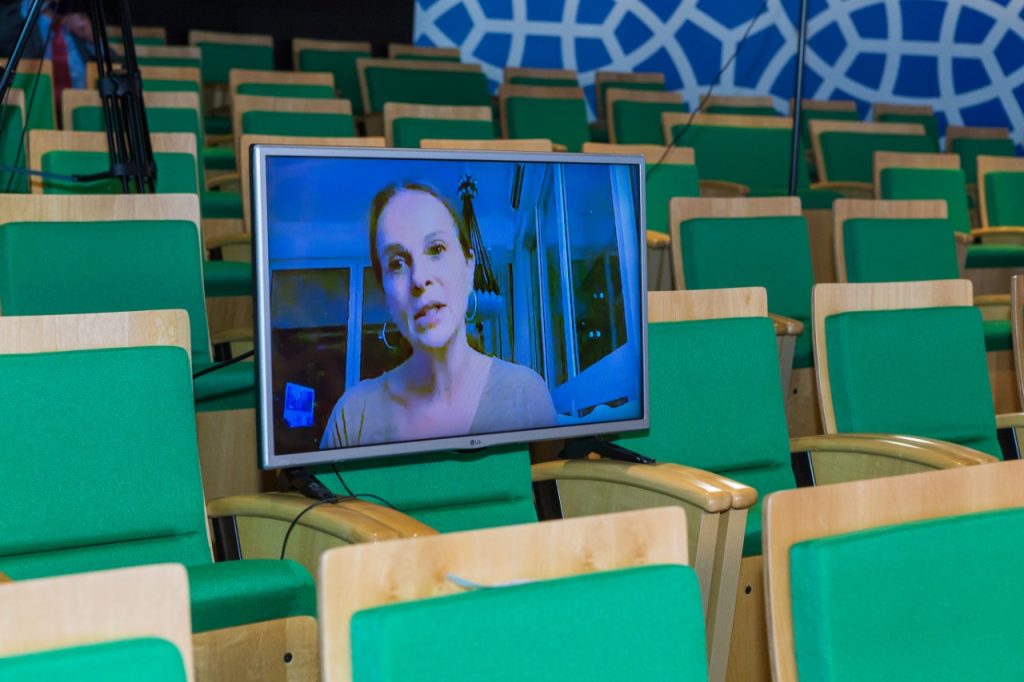São Paulo – The Arab Brazilian Chamber of Commerce (ABCC) hosted an online event this Wednesday (22) to mark its 68 years in existence. Arabs and Arab descendants who live in Brazilian land were invited to give testimonials. They are from different walks of life and age ranges, with varying degrees of proximity to their Arab roots. Still, most of them claimed to be proud of their shared Arab background and of Arabs’ achievements in Brazil. Pictured above is journalist Sonia Racy, who was featured in testimonial footage.

Advertising practitioner Roberto Duailibi was also featured. His São Paulo-born mother met his father in Lebanon, where he was born, and then they moved to São Paulo together. “They raised their seven children with a lot of love for Lebanon, as well as for their kin and all other descendants. I take great pride in my roots and I identify with the work that the ABCC is doing to build ties between Brazil and that part of the world,” he said.

Hedel Fayad, a retired brigade general, is also of Lebanese descent. His parents settled in Brazil in 1930. “Our grandparents, parents and uncles devoted themselves to commercial activity so that us children and grandchildren could pursue an education. Just as we tout our pride on our Lebanese blood, we are also aware of our responsibility of representing and honoring our ancestors,” said Fayad.
Journalist Sonia Racy of newspaper O Estado de São Paulo recalled a lesson she learned from a Lebanese elder. “Here’s what he told me: ‘My dear, if you don’t know where you’re from, you won’t know where you’re headed.” My four grandparents came from Lebanon. I am deeply interested in anything that relates to my origin,” she said in a filmed testimonial.
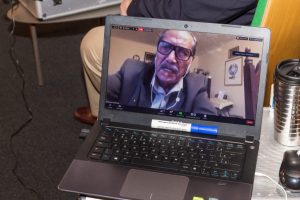
Institute of Arab Culture (ICArabe) president Mohamed Habib gave his take on what it’s like being an Arab immigrant in Brazil. “It’s a complex process, what with so many radical changes involved. It’s not easy to adapt to a different language, different habits. It’s not easy to communicate or to adapt to a new country, and moreover you miss the country that you came from. I can only speak for myself, and I was very lucky. In my process of adapting to Brazil, of integrating and paying my dues, I believe I was very lucky, and I thank God for all that I was graced with here in Brazil. I count myself a happy immigrant,” he said.

Renata Maron, a TV presenter for Grupo Bandeirantes who’s an Arab descendant on the paternal side, lauded the community’s achievements in Brazil. “I find it really interesting to see how Arabs have contributed to multiple aspects of Brazilian society, whether it be cuisine, art, culture, medicine or technology,” she said. Maron went to Saudi Arabia last year and felt closer to her roots. “I carry the surname Maron with a lot of pride. I’m proud of being Arab,” she said.

Lar Sírio president and ABCC board member William Adib Dib Junior’s paternal grandfather was born in Homs, Syria. “I take great satisfaction and pride in being a descendant of Syrians. This is a very humble, hard-working community who adopted Brazil as their homeland. The Arab community in Brazil has always been very well represented, whether it be in the social and sporting realm, with clubs like Club Homs, Esporte Clube Sírio and Clube Atlético Monte Líbano, or the cultural organizations and charities that have proven to be great assets of Brazilian society,” he argued.
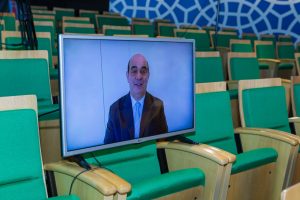
Adib Dib Junior also mentioned institutions like the ABCC, the Syrian Home for Children, Heart Hospital, the Syrian-Lebanese Hospital, and elderly support charity Associação Beneficente Mão Branca de Amparo aos Idosos. “Many of them have existed for a century, they assist the entire population, and they are go-to institutions in their lines of work,” he emphasized.
Physician and University of São Paulo (USP) professor Alvaro Sarkis seconded the relevance of the organizations and hospitals brought up by Adib Dib Junior. “My paternal and maternal families immigrated to Brazil in the 1910s,” he said, pointing out that many of the charities were established during that time.
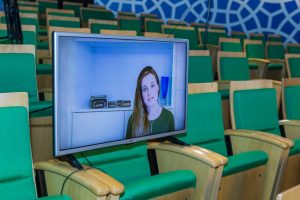
Journalist Marina Sarruf Machado is a granddaughter to a Syrian immigrant. She was a Brazil-Arab News Agency (ANBA) reporter early on. The agency’s stated mission is to help connect Brazilians and Arabs through its news. “I am really proud of having been in ANBA, which gets about 80,000 views a month at this point and is getting better and better known in Brazil and the Arab countries,” she says. Machado had a seven-year stint with ANBA. She’s currently in the ABCC’s Communication Department.

Ambassador and ABCC International Relations vice-president Osmar Chohfi, who has Syrian-born paternal and maternal grandparents, said this was an occasion in which to celebrate. “First of all, to celebrate those that decided to set off to a new world with determination. They brought along their entrepreneurial capabilities and above all the courage to take on the challenges ahead of them. This is the story of thousands of families across the Arab world who looked to Brazil, a land of opportunity, to convert their aspirations and yearnings into personal and professional achievement. This is the story of my father’s and mother’s families,” he said.
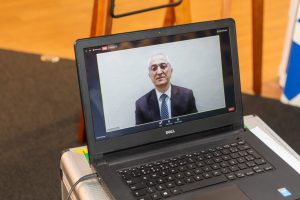
Hospital Oswaldo Cruz Oncology Center director and ABCC Marketing vice-president Riad Younes considers himself “a proud member of this great Arab-Brazilian community, first and foremost.” The Lebanon-born physician fled to Brazil during the civil war in 1976. “During my first hours in São Paulo, I felt welcomed and doubly embraced by the Arabs and the Brazilians. I felt welcome, I pursued my studies and I labored. Not once did I feel targeted by discrimination or intolerance. As I came up through the ranks in my career, I was constantly thinking of how to give back,” said Younes, who has engaged in community service and keeps contributing to the work of the ABCC.

Former president of Brazil Michel Temer discussed his Lebanese roots. “I would like to state my pride in being a son to Lebanese parents,” he said. His political career is proof of how welcoming Brazil is of foreigners, Temer argued, “I was able to pursue a career in politics, and I served as House speaker on several occasions. Likewise, I have been vice-president and president, and that attests to how well Arabs have integrated in Brazil. And so for this celebration I would once again like to express my pride in my background, and particularly my pride in having been born here. Lebanon and Brazil walk hand in hand and will continue to do so, the Arab community and Brazil,” he said in a testimonial video.
The webinar also featured the presentation of a survey that has shown that Brazil is home to 11.6 million Arabs and Arab descendants. The information was presented by Ibope Inteligência CEO Márcia Cavallari Nunes and by H2R Pesquisas Avançadas director Alessandra Frisso. Featured speakers included ABCC president Rubens Hannun, Policy Council chairman Walid Yazigi, and secretary-general Tamer Mansour, plus the dean of the Council of Arab Ambassadors in Brazil and ambassador of Palestine, Ibrahim Alzeben. Arab League secretary-general Ahmed Aboul Gheit was featured in a filmed testimonial.
For more on the survey and the virtual event please check out:
Arabs, descendants are 6% of Brazil’s population: survey
Ten pct of Brazil’s business leaders are Arab or descendants
Arab descendants: 41% are third-generation immigrants
Arab Brazilian Chamber announces creation of Arab House
You can watch the full webinar here:
Translated by Gabriel Pomerancblum



